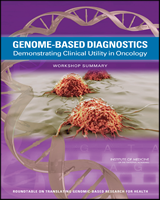NCBI Bookshelf. A service of the National Library of Medicine, National Institutes of Health.
Genome-Based Diagnostics: Demonstrating Clinical Utility in Oncology is the summary of a workshop convened in May 2012 by the Roundtable on Translating Genomic-Based Research for Health and the Center for Medical Technology Policy of the Institute of Medicine to foster the identified need for further sustained dialogue between stakeholders regarding the clinical utility of molecular diagnostics. The workshop brought together a wide range of stakeholders, including patients, health care providers, policy makers, payers, diagnostic test developers, researchers, and guideline developers, to identify the challenges and opportunities in advancing the development and use of molecular diagnostic tests designed to guide the treatment and management of patients with cancer.
The sequencing of the human genome has greatly accelerated the process of linking specific genetic variants with disease. These findings have yielded a rapidly increasing number of molecular diagnostic tests designed to guide disease treatment and management. Many of these tests are aimed at determining the best treatments for specific forms of cancer, making oncology a valuable testing ground for the use of molecular diagnostic tests in medicine in general. Nevertheless, many questions surround the clinical value of molecular diagnostic tests, and their acceptance by clinicians, payers, and patients has been unpredictable. A major limiting factor for the use of these tests has been the lack of clear evidence of clinical utility. Genome-Based Diagnostics assesses the evidentiary requirements for clinical utility of molecular diagnostics used to guide treatment decisions for patients with cancer; discusses methodologies related to demonstrating these evidentiary requirements that meet the needs of all stakeholders; and considers innovative, sustainable research collaborations for generating evidence of clinical utility involving multiple stakeholders.
Contents
- THE NATIONAL ACADEMIES
- PLANNING COMMITTEE
- ROUNDTABLE ON TRANSLATING GENOMICBASED RESEARCH FOR HEALTH
- Reviewers
- Acknowledgments
- Abbreviations and Acronyms
- 1. Introduction
- 2. Setting the Context
- 3. Perspectives from Stakeholders
- 4. Tools for Generating and Synthesizing Evidence
- 5. Advancing Molecular Diagnostics for Oncology
- BIOMARKER STUDIES IN MULTICENTER CANCER CLINICAL TRIALS: THE ROLE OF COOPERATIVE GROUPS
- PARTNERING FOR THE CURE: AN INNOVATIVE ROLE FOR ACADEMIA IN ONCOLOGY DRUG AND DIAGNOSTIC DEVELOPMENT
- PATIENT APPROACHES TO COLLABORATION
- NOVEL PARTNERSHIP STRATEGIES TO DEVELOP EVIDENCE OF CLINICAL UTILITY
- ASSESSING CLINICAL UTILITY WITH REAL-WORLD EVIDENCE
- CONCLUDING REMARKS
- References
- APPENDIXES
Rapporteurs: Adam C. Berger and Steve Olson.
This project was supported by contracts between the National Academy of Sciences and the American Academy of Nursing (unnumbered contract); American College of Medical Genetics and Genomics (unnumbered contract); American Heart Association (unnumbered contract); American Medical Association (unnumbered contract); American Society of Human Genetics (unnumbered contract); Association for Molecular Pathology (unnumbered contract); Blue Cross and Blue Shield Association (unnumbered contract); Centers for Disease Control and Prevention (Contract No. 200-2011-38807); College of American Pathologists (unnumbered contract); Department of the Air Force (Contract No. FA7014-10-P-0072); Department of Veterans Affairs (Contract No. VA248-P-1528); Eli Lilly and Company (unnumbered contract); Genetic Alliance (unnumbered contract); Health Resources and Services Administration (Contract No. HHSH250201100119P and Contract No. HHSH25034017T); International Society for Cardiovascular Translational Research (unnumbered contract); Johnson & Johnson (unnumbered contract); The Kaiser Permanente Program Offices Community Benefit II at the East Bay Community Foundation (Contract No. 20121257); Life Technologies (unnumbered contract); National Cancer Institute (Contract No. N01-OD-4-2139, TO#189 and Contract No. HHSN263201200074I, TO#5); National Coalition for Health Professional Education in Genetics (unnumbered contract); National Heart, Lung, and Blood Institute (Contract No. N01-OD-4-2139, TO#275); National Human Genome Research Institute (Contract No. N01-OD-4-2139, TO#264 and Contract No. HHSN263201200074I, TO#5); National Institute of Mental Health (Contract No. N01-OD-4-2139, TO#275 and Contract No. HHSN263201200074I, TO#5); National Institute of Nursing Research (Contract No. HHSN263201200074I, TO#5); National Institute on Aging (Contract No. N01-OD-4-2139, TO#275 and Contract No. HHSN263201200074I, TO#5); National Society of Genetic Counselors (unnumbered contract); Northrop Grumman Health IT (unnumbered contract); Office of Rare Diseases Research (Contract No. N01-OD-4-2139, TO#275); Pfizer Inc. (unnumbered contract); and PhRMA (unnumbered contract). The views presented in this publication do not necessarily reflect the views of the organizations or agencies that provided support for the activity.
Suggested citation:
IOM (Institute of Medicine). 2013. Genome-based diagnostics: Demonstrating clinical utility in oncology: Workshop summary. Washington, DC: The National Academies Press.
NOTICE: The workshop that is the subject of this workshop summary was approved by the Governing Board of the National Research Council, whose members are drawn from the councils of the National Academy of Sciences, the National Academy of Engineering, and the Institute of Medicine.
- NLM CatalogRelated NLM Catalog Entries
- Review The Value of Genetic and Genomic Technologies: Workshop Summary[ 2010]Review The Value of Genetic and Genomic Technologies: Workshop SummaryInstitute of Medicine (US) Roundtable on Translating Genomic-Based Research for Health. 2010
- Review Generating Evidence for Genomic Diagnostic Test Development: Workshop Summary[ 2011]Review Generating Evidence for Genomic Diagnostic Test Development: Workshop SummaryInstitute of Medicine (US) Roundtable on Translating Genomic-Based Research for Health. 2011
- What do providers, payers and patients need from comparative effectiveness research on diagnostics? The case of HER2/Neu testing in breast cancer.[J Comp Eff Res. 2013]What do providers, payers and patients need from comparative effectiveness research on diagnostics? The case of HER2/Neu testing in breast cancer.Trosman JR, Weldon CB, Schink JC, Gradishar WJ, Benson AB 3rd. J Comp Eff Res. 2013 Jul; 2(4):461-77.
- Methodological recommendations for comparative research on the treatment of chronic wounds.[J Wound Care. 2013]Methodological recommendations for comparative research on the treatment of chronic wounds.Sonnad SS, Goldsack JC, Mohr P, Tunis S. J Wound Care. 2013 Sep; 22(9):470-80.
- Review Assessing Genomic Sequencing Information for Health Care Decision Making: Workshop Summary[ 2014]Review Assessing Genomic Sequencing Information for Health Care Decision Making: Workshop SummaryRoundtable on Translating Genomic-Based Research for Health, Board on Health Sciences Policy, Institute of Medicine. 2014 Aug 19
- Genome-Based DiagnosticsGenome-Based Diagnostics
Your browsing activity is empty.
Activity recording is turned off.
See more...
